
In a rare and exclusive one-to-one interview, Virat Kohli sat down with Wisden Cricket Monthly magazine editor Jo Harman to discuss his first 10 years as an international cricketer, what life outside of the game looks like for a 21st-century deity and the future of “the most beautiful format”.
This article originally appeared in the September 2018 issue of Wisden Cricket Monthly. Click here to subscribe to the magazine
It’s four years since I first approached Virat Kohli’s team for a sit-down interview with the most in-demand cricketer in the world and after several false leads and probably more than a hundred emails, India’s captain is finally ready and waiting. Well, almost.
As I stand in a corridor outside a hotel room at the Taj Hotel in St James’ Court, London, waiting to be summoned, Kohli has some filming to finish up first. He is the subject of a National Geographic documentary as part of a new series in which scientists and psychoanalysts explore the lives of five Indian national icons and attempt to decipher whether geniuses are born or made. Watching Kohli’s 149 at Edgbaston two weeks later, it feels a pertinent question.
[caption id=”attachment_82863″ align=”alignnone” width=”800″]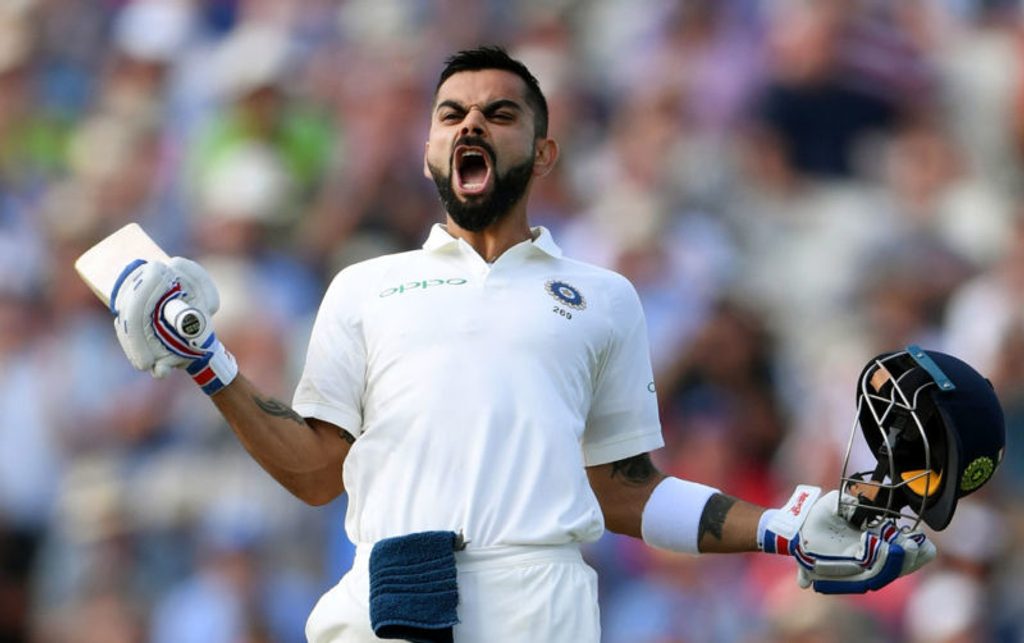 Celebrating his first Test century on English soil[/caption]
Celebrating his first Test century on English soil[/caption]
Mike Brearley believes genius requires a combination of the “instinctual” with “passionate devotion and hard work” and Kohli’s innings at Edgbaston, his 22nd Test century three months before his 30th birthday, was a perfect marriage of the two.
With Kohli now having completed 10 years as an international cricketer, there is little doubt that we are watching a genius at work, and one who transcends his sport. He was recently ranked No.11 in the World Fame 100, ESPN’s annual list of the most eminent athletes, and was the only cricketer in the Forbes Top 100 of the world’s highest-paid sportspeople last year, with estimated earnings of $24million.
Those numbers are still swirling around my head as my phone buzzes and I’m asked to enter. Kohli is ready.
In the UK we find it hard to comprehend the level of attention and adulation that Indian cricketers, and you in particular, receive in your home country. How do you cope with it?
When England came to India last, Alastair [Cook] asked me the same. Even players who’ve toured many times, it still amazes them how much passion and attention people have towards cricket in India. I said, ‘You just get used to it’. There is literally no other option. You cannot avoid it. I don’t try and fight it anymore. I’ve tried to do that in the past, where I wanted people to understand to an extent what an individual wants in terms of space and just to be able to have a normal life… for a bit! But that is very, very difficult to expect when you have so many people wanting to see you or meet you or are inspired by you. So I’ve come to terms with the fact that it’s just something you have to accept.
Does it help that your wife Anushka [Sharma, the Bollywood actress and film producer] understands what it’s like to be in the public eye?
That was one of the reasons why we got along so well, to be able to understand each other’s mindset and the demands of being in such a position. And also the fact that we are so similar in terms of the backgrounds we have. People do not understand us at all. They think we live a fairytale life and things are only of royal standards, but in reality we are really normal people. We are in the public eye so it seems too far-fetched for the public to connect with, but we lead a very simple life at home. And that’s how we like to live. We do something that is in the public eye but we never chose to be recognised in this way.
[caption id=”attachment_82866″ align=”alignnone” width=”800″]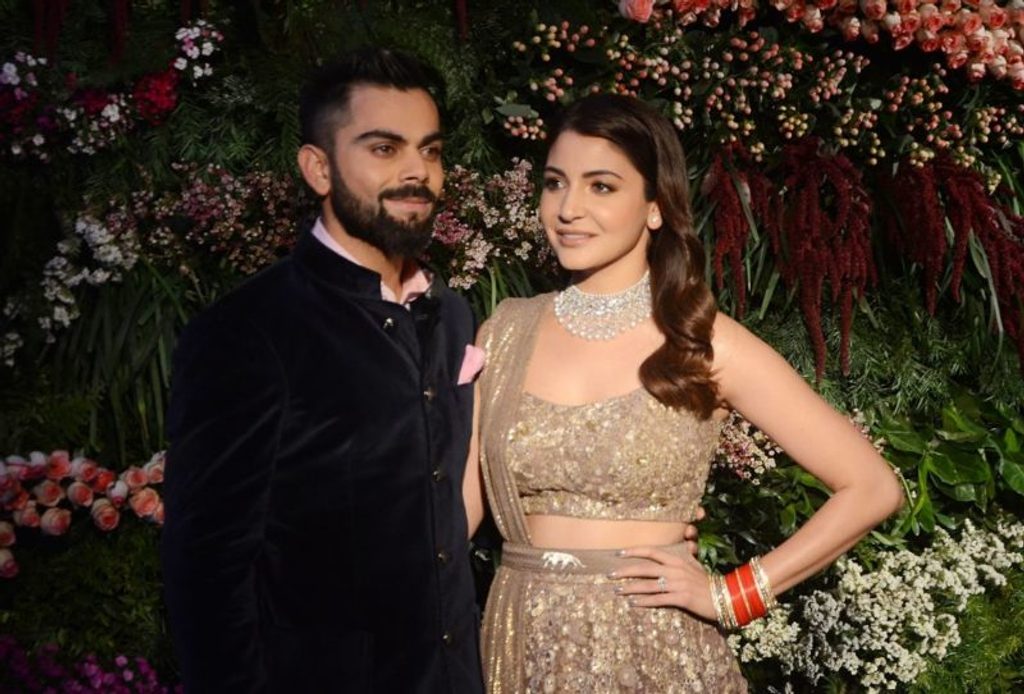 Kohli and Anushka Sharma married in December 2017[/caption]
Kohli and Anushka Sharma married in December 2017[/caption]
You’re one of the most influential figures in India essentially because, on a most basic level, you’re exceptionally good at hitting a cricket ball. Is that difficult to get your head around?
Ever since I’ve been with my wife we understand the responsibility that we have as known people back home. It’s not only in terms of inspiring people through what I do or she does, but how we portray ourselves as a couple as well, and to set the right example there – to teach people the right things to follow and not worry too much about what people are going to say, because that can be a massive factor back home. We take this as a responsibility of being in the position that we are. Even in cricket now, for me it’s not about what I want to achieve as a cricketer, it’s more to do with how I can inspire the next lot of players. I feel that is more of a responsibility now, and not merely going on the park and hitting a ball.
You play so much cricket, rarely missing matches and captaining India in all three formats. Psychologically, how do you stay on top of things and balance that with other aspects of your life?
I think there’s no limit to what you can do, as long as you’re happy doing it. I don’t believe that if you are busy in life in general that your sport is going to get compromised. A 24-hour day is a long time to be able to do things. Spending time at home is something we really look forward to, then my sport is my priority as well, but apart from that I do a lot of commercials, a lot of businesses as well, which I’m actively involved in. It gives me a sense of working towards something all the time. I don’t feel the burden at all, to be honest. I love having the opportunity to be so busy in life.
How do you relax outside of cricket?
We really enjoy our time when we come to other countries. We get to walk around and that’s very liberating, to be able to enjoy normal stuff like going out for breakfast or to coffee shops, because we don’t walk at all back home – it’s only getting out of our house, into our car and going wherever we want to go, then back into our car to go home. We love pets, so if we see dogs around we play with them. We can literally do whatever we want in terms of buying things or having something but to be able to enjoy and be grateful about life every day is something that we take very seriously.
***
On August 18, 2008, five months after captaining his country to victory at the Under 19 World Cup in Malaysia, the pudgy teenager touted as ‘the next Sachin’ walked out to open the batting in his first senior international appearance, an ODI in Dambulla, Sri Lanka. It was an inauspicious start for the 19-year-old who scored 12 from 33 balls in a comprehensive defeat.
He would have to wait more than a year for his first ODI century and his ascent to the Test team was considerably slower. Not until a gutsy hundred from No.6 against Australia at Adelaide in January 2012 was his place in the five-day side secured. In the period since, only Steve Smith can match his 23 Test centuries, while Kohli’s limited-overs record is unparalleled in this or any other era.
He has previously described the conclusion of a disappointing 2012 IPL campaign as a watershed moment when he discovered his now-famous work ethic and fitness regime – factors that have been pivotal in his rise to become the best pound-for-pound batsman in the world.
“Kohli evolved before our eyes, beginning as a talented batsman with rough edges but with the enormous good fortune to be playing in a team with Tendulkar, Laxman, Dravid and Sehwag,” says Wisden India editor Suresh Menon. “He absorbed important lessons from each of them. A quick learner, Kohli found his uniqueness in assimilating the best practices of others. And in adding his own flavour to the package.”
How quickly have the last 10 years gone by?
I’m close to 10,000 ODI runs and I still can’t believe it; I walk out and I feel like I’m still a club cricketer playing my first match. I still have to get that first run. And I’m so happy and grateful that I still have that feeling and I don’t think, ‘Oh, I’ve done everything’. I still have that respect for the game that I had in my first match. I know that when that feeling dies off it’s going to be time. But the fact that it has gone on for so long, and it has made me work hard on my game – continuously, relentlessly – is so wonderful to experience.
[breakout]I really laugh at a lot of the things I did when I was younger but I’m proud that I did not change my ways because I was always going to be who I am and not change for the world or for anyone else[/breakout]
How do you reflect on your younger self? Are there moments you look back on where you think, ‘I wish I hadn’t done that!’?
Yeah, the one thing I remember most is when I’d had enough of the Australian crowd at Sydney [in 2012] and I just decided to flick a [middle] finger at them. ‘I’m so cool’. The match referee [Ranjan Madugalle] called me to his room the next day and I’m like, ‘What’s wrong?’. He said, ‘What happened at the boundary yesterday?’. I said, ‘Nothing, it was a bit of banter’. Then he threw the newspaper in front of me and there was this big image of me flicking on the front page and I said, ‘I’m so sorry, please don’t ban me!’. I got away with that one. He was a nice guy, he understood I was young and these things happen. I really laugh at a lot of the things I did when I was younger but I’m proud that I did not change my ways because I was always going to be who I am and not change for the world or for anyone else. I was pretty happy with who I was.
[caption id=”attachment_80114″ align=”alignnone” width=”800″]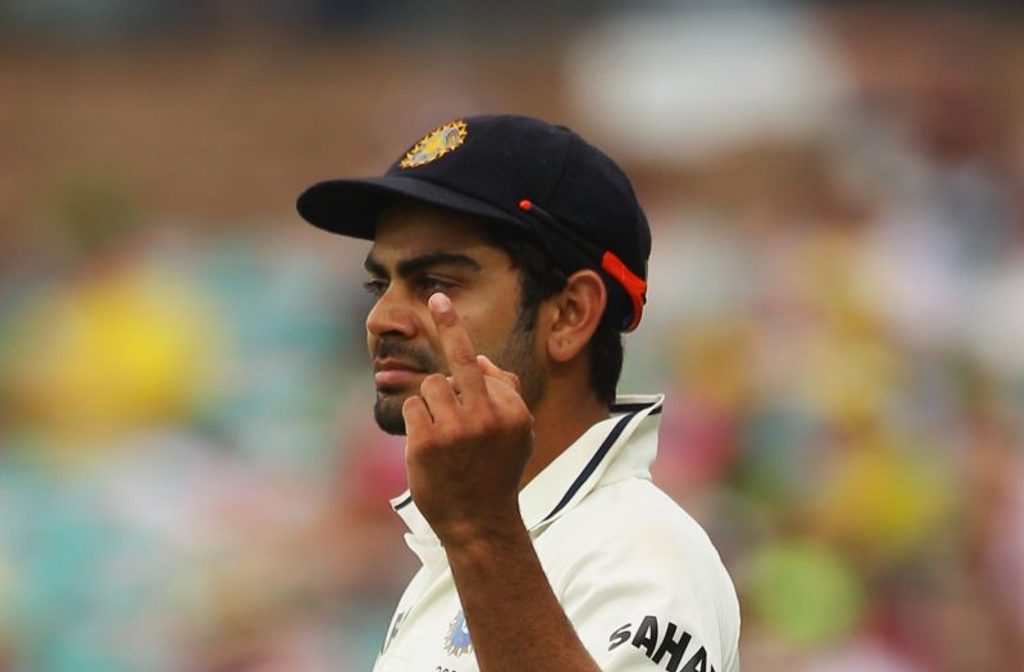 “I said to the match referee, ‘Please don’t ban me!'”[/caption]
“I said to the match referee, ‘Please don’t ban me!'”[/caption]
Did anyone have to pull you into line in your early career?
There was my coach, Rajkumar Sharma, who was always looking at things from the outside and he understood me the most, after my family, because I had interacted him so much over the years. My family as well. Every time they felt like I was not on the right path they told me. But my coach was the one that was very stern with me. If I was doing something wrong he would make sure that he got that across, one way or the other. He was the only person I was scared of when I was growing up. I went into his academy when I was nine and even now I still speak to him about my game.
Yuvraj Singh said that when he tried to give you advice as a youngster you didn’t listen because you were so distracted by all the other things around you. Do you recognise that version of yourself?
Yeah, definitely. I look forward to guiding the young guys in the team to not make the same mistakes that probably I made when I was their age because I want them to have three more years of quality cricket compared to going up and down, struggling here and there and then finally finding their feet. If I see someone making the same mistakes that I committed and I cannot correct them, then it’s my failure. If I choose to stay quiet I’m not really doing my job. You don’t want to suffocate anyone but the mistakes I made early in my career, as Yuvraj rightly pointed out, I would not like to see youngsters make them more than once, because that’s just wasting such an important phase of their lives and careers.
[breakout id=”0″][/breakout]
Who are the people you’ve most enjoyed speaking to and learnt the most from during your career?
Gary Kirsten and Duncan Fletcher [former India coaches] are probably the two people I’ve enjoyed discussing cricket with the most. Gary was all about the feel of the game – how you feel as a player and how confident you are mentally. Those small things really matter because I know how to strike a cricket ball but how to get into a zone where I am confident of striking the cricket ball is something I would discuss with Gary. And the same with Duncan as well. To be able to see the game in a particular manner is so much more important than to be able to hit that cover drive.
[caption id=”attachment_82864″ align=”alignnone” width=”800″]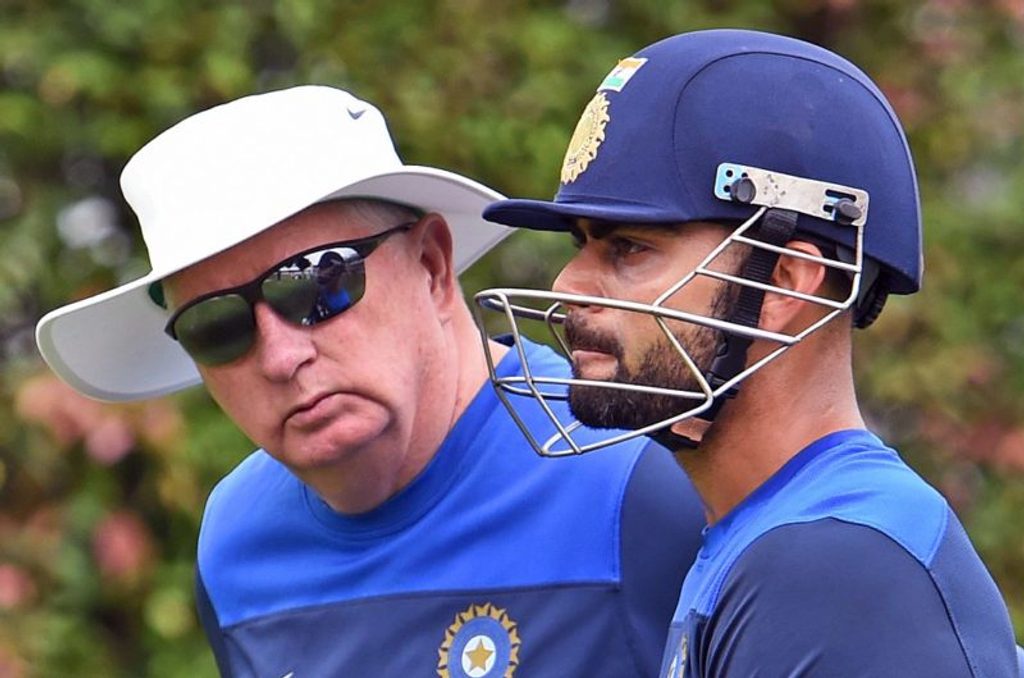 Duncan Fletcher had a profound influence on Kohli’s game[/caption]
Duncan Fletcher had a profound influence on Kohli’s game[/caption]
Michael Vaughan told Wisden Cricket Monthly that no person has done more for English cricket over the last 20 years than Duncan Fletcher. He’s clearly had a big influence on a lot of players.
Duncan has such a great understanding of what a particular player needs to correct his game. He would stand in front of me when I was batting in the nets and tell me, ‘Open your shoulder two inches’. Then I would do that and my game would open up and I would be like, ‘What was that!?’. It was that small. If he told me that then he wouldn’t apply it to Shikhar Dhawan or MS [Dhoni] or anyone else. That was for my game. That’s how well he understood individual players.
India were incredibly impressive as they won the Under 19 World Cup earlier this year – intimidatingly so if you support any other country. How exciting is it to see the next generation of talent coming through?
I saw some of these guys in the IPL as well and I was stunned by some of the talent. You have two guys bowling almost 150 clicks and someone like Prithvi Shaw playing shots that I couldn’t even imagine at my age, hitting some of the fastest bowlers in the world for sixes at the IPL that were quite astonishing. I believe that you have to be accepting and comfortable with the fact that the next generation is always going to be better, and you have to bring in these guys accordingly and unleash them at this level. I’m not someone who will wait for people to go through the whole grind and see how they go in four, five or six years, because you might just lose out on the best years of their life.
Do you make a point of taking the brightest talents aside to tell them that you see a big future for them in the Indian team?
In my initial years when someone around me would say ‘You’ve been looked at to play for the Indian cricket team’ I would lose perspective about what needs to happen right now, and I don’t want that to happen with them. But I’m very confident these guys will make it to the top level very, very soon and some of the guys are mature beyond their years.
Have you watched previous Indian captains and picked up aspects of their leadership?
Not really anyone before MS. I was always someone who kept talking to him about the game so even when I was really young, before I was made vice-captain, I would give him my suggestions. Not in a way that I thought I knew better but I felt at certain moments I could probably see this thing that someone else might not be able to pick up. So why not go and express myself? I love thinking about the game and that’s why I enjoy captaincy so much and I enjoy chasing totals so much – I love using my brain to figure out what needs to be done during the game. I’ve learned the most from MS, standing so close to him at slip so many times and just observing him at close quarters.
How would you characterise your captaincy?
I think every captain flushes in the mindset that he has himself to his team and I’ve always played my cricket with positivity. When I do well or I don’t do well, it’s not about thinking twice, only going forward. Results are a bi-product of that mindset. I believe in giving total freedom to the guys to go out there and play the way they want to, and to be fearless. You can make mistakes by being positive, lack of execution is fine, but hesitation is something that I cannot relate to myself so I would never want the players to play that way.
[breakout]If you really understand the sport, if you really love the sport, you understand Test cricket and you understand how exciting it is[/breakout]
What have been the biggest challenges during your time as captain?
Not many. I’ve really enjoyed myself so far. I just wanted to play cricket at this level and now I’ve been given such an honour to captain my country, I cannot complain at all. It allows me to set the right example and work hard, so I can expect my teammates to work as hard. It has only helped me grow as a person and make me understand the game better and what needs to be done at different points of the game, or in life in general. You learn so many things about what are controllables, what are not controllables, respecting losses and working hard towards victory. When decision-making is on you, you need to be very aware of what you are doing and that makes you aware as a person in general.
How sustainable is it for you to captain India in all three formats?
I love it. It’s such a short span in my life. I’m not someone who’s ever looked for a comfort zone. I don’t think there is an option of giving up in life, especially when you have such a short career. Think about it… there are 1.3 billion people back home and only 16-20 people in that pool regularly play for their country. On top of that you’re on top of the pile, and if I complain there, I really have to be ungrateful about everything that’s been given to me.
[caption id=”attachment_82865″ align=”alignnone” width=”800″]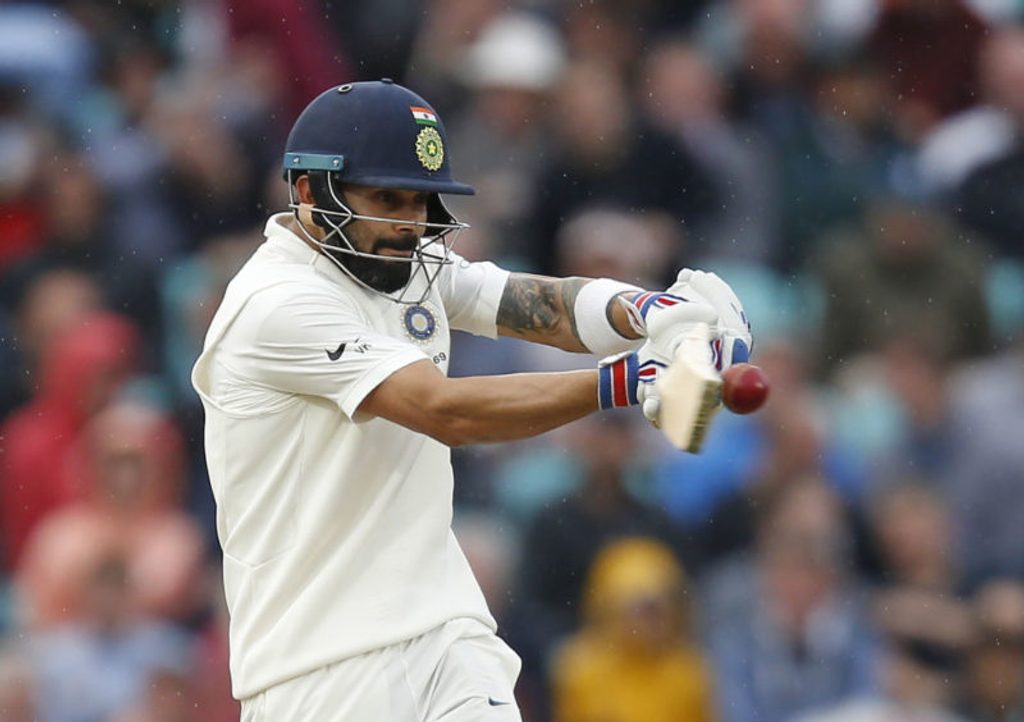 Kohli scored 593 runs at 59.30 in the 2018 Test series against England[/caption]
Kohli scored 593 runs at 59.30 in the 2018 Test series against England[/caption]
By playing and talking about Test cricket with such passion, you’ve helped to give the format a real shot in the arm. Do you have concerns for its future though?
In a few countries, yes. It all depends on the awareness of people who watch the game. If you take a country like South Africa or Australia or England, they have big crowds for Test matches because people understand the sport. It’s literally living life over five days. There are so many ups and downs and even when you’ve done well you’ve got to keep coming back and doing it all over again. There are no guarantees in life either. If you’ve had a good day it doesn’t mean that the next day is going to be good automatically. You’ve got to work towards it. Or if you’ve had a bad day there’s no option of staying at home. I think that if you really understand the sport, if you really love the sport, you understand Test cricket and you understand how exciting it is. I cannot explain to you the job satisfaction that you get when you do well in Test cricket, because you know how demanding it is. It’s the most beautiful format of the game. I don’t think it’s going to go anywhere. I don’t even see it getting compressed to four days.
You see four-day Test matches as a backward step?
Definitely. It should not be tinkered with.
Are you in favour of the forthcoming Test Championship?
I think that is going to give a huge push to Test cricket. It makes every series more competitive, and there’s going to be ups and downs throughout the Championship, which I really look forward to. The teams that love playing Test cricket are always going to be passionate about it. And it also depends on the system you have back home as well. If you’re not going to give more importance to first-class cricket, then people are going to lose motivation to play the longest format of the game. And with the T20 format coming in I think there’s far greater responsibility on all the cricket boards across the world to treat first-class cricket really well, because if the facilities and the standard goes up, then the motivation always stays. You don’t want players to get into that mindset where they’re finding the easy way out.
India haven’t played a Test match against Pakistan during your career. Do you think that will change, and is it a match you’d like to play in given the opportunity?
They have such a quality bowling attack that obviously as a batsman I would love to face them. It could happen but it’s not something that I have any aspirations of or something that I really want badly. I don’t pinpoint things anymore. If you asked me 10 years ago whether I would be here in my life, be having a career like I’ve had, I wouldn’t even dream of it. So I am very happy with how life is going and I’m pretty happy taking every day and series as it comes.
***
Kohli speaks with such verve and feeling about the game, and has such strong views on its future, that before we wrap up I ask, slightly tongue in cheek, whether he’d consider a job at the ICC or BCCI when he calls time on his playing career. He laughs. A lot.
“The reason I do so many things at one time is to not be in a position of having to do something in life after I’m done,” he says. “I want to be able to spend time with my family, give a good life to my kids, travel with my wife and just enjoy life for a few years. I don’t want to think about anything else. I will have done this for too long to be able to come back immediately into the game. If there are any changes in the system required, I would always take that step for cricketers, not just because I want to be seen on TV. I’ve had enough of that. I get that on a daily basis.
[breakout type=”related-story” offset=”0″][/breakout]
“I understand that life is much larger than any of this and before I started to play cricket life was there, and it’s going to continue after. I just want to be able to enjoy everything and not have cricket as the only identity in my life and have nothing else to look forward to or have any knowledge of. I want to keep learning.”








